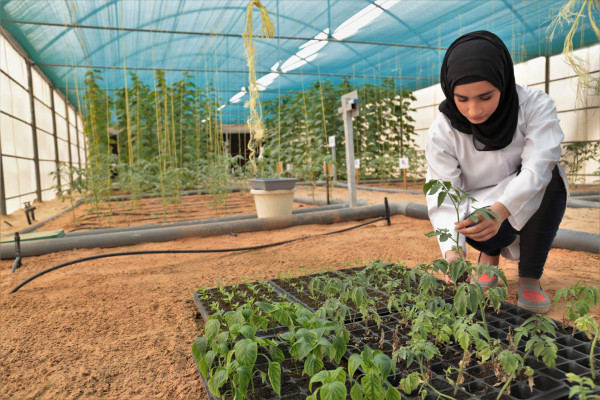
Over 150 young people gathered on Zoom on Monday June 1st, for a riveting discussion with our esteemed guests HE Mariam bint Mohammed Almheiri, Minister of State for Food Security and Dr. Ismahane Elouafi, Director General of the International Center for Biosaline Agriculture, to discuss the future of food and sustainable food production in the UAE.
With 99% of our attendees voting for sustainable food and diet as a priority for a green recovery post-COVID-19, this session proved valuable in drawing an optimistic picture of the future of food in our nation & the world.
Most agreed that it is imperative that we reduce food waste (85% of respondents) and improve our consumption habits and connection with food and how it is produced (73% of respondents), investing in local food production also came high on the list of priorities (62% of respondents), with many of our young attendees seeming eager to start their own home or community farms.
There is no doubt that the UAE is doing amazing work in the realm of food security, but few of our attendees knew what was really going on. Her excellency took us through UAE’s National Food Security plan, which approaches the food challenge from both the production and food waste angle. We learned that the UAE is invested in addressing the food security challenge through a multifaceted approach that works on:
- Facilitating agri-business & diversifying the sources from which we import our food.
- Enhancing sustainable technology-enabled domestic food supply.
- Reducing food loss and waste through awareness and new policies.
- Sustaining food safety and improve nutritional intake.
- Enhancing the UAE’s capacity to respond to food security risks and crises.
And the UAE has made great progress so far when it comes to sustainable technology-enabled domestic food supply, with the country now growing blueberries, quinoa, millet, and farming salmon and hammour, using technologies such as hydroponics, vertical farming and aquaponics.
We also learned that a sustainable, diversified agricultural systems using the right crops is key. And what Dr. Ismahane explained would be the right crops, are those that have longer or more diverse value chains. Some examples would be halophytes (plants tolerant to salty water) such as pearl millet & quinoa which in addition to being super nutritious, can be used in a variety of ways. Another really interesting crop ICBA is working on is Salicornia, an edible highly nutritious plant that can be used to make fuel, feed animals as well as humans!
The UAE continues to make great strides in ushering a positive future for food, with efforts in research and development as well as defining policies such as improving accessibility to nutritious food and increasing affordability of healthy food that will give everyone (including vulnerable groups) an opportunity to have a healthier and more sustainable lifestyle. To learn more about local initiatives and opportunities to get involved visit: https://foodsecurity.gov.ae